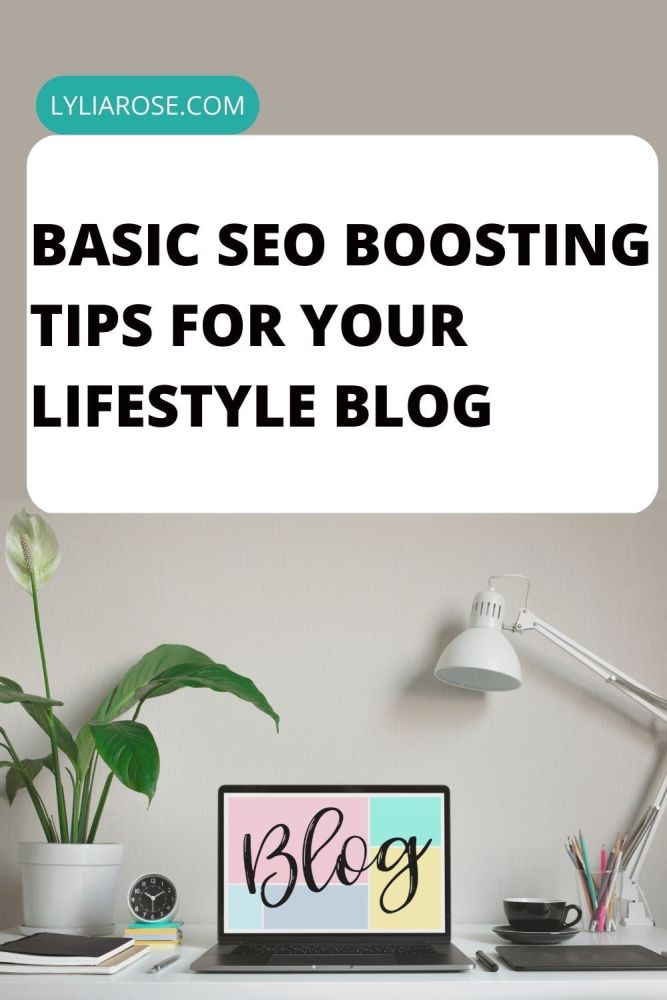Basic SEO Boosting Tips For Your Lifestyle Blog
Posted on
When it comes to running a successful lifestyle blog, search engine optimization (SEO) is key. SEO can help your blog rank higher in search engine results pages, which means more traffic and potential revenue. In this post, we'll share some basic SEO boosting tips for your lifestyle blog to help you get started.

Basic SEO tips for your lifestyle blog
Search engine optimisation, otherwise known as SEO, is a phrase that is thrown around a lot in the digital marketing world. As a lifestyle blogger, it is important to make sure you are optimising your content for increased SEO.
Poor SEO will result in poor visibility online, and in return, a poor audience. If you are serious about wanting your lifestyle blog to succeed, you need to make sure you are clued up on what SEO is, how it works, and how you can create the best possible content to boost your online presence. Many bloggers launch new blogs and expect traffic to just appear, but it doesn't work like that. Unless you are already well-known, you will need to implement SEO on your blog, and even if you are already famous, SEO will help your visibility online.
Now, let's dive into the tips!
Be an expert in your field
To succeed in the competitive world of blogging, it's essential to establish yourself as an expert in your field. Every blog has a unique niche, and it's important to build on this with every post.
While it's impossible to be an expert in everything, it's essential to become an expert in your chosen field. Identify the top five subjects you want to blog about and be known for, and stick with them. This will help you develop a strong reputation and attract a dedicated audience.
To attract the right audience and improve your SEO, focus on writing relevant and unique content a few times a month. This will help establish your expertise and keep your readers engaged. It will also keep you engaged - if you plan to be a full-time blogger then you'll want to ensure you are passionate about the topics you write about. Don't just choose a popular blogging topic, but choose something you actually care about.
It's worth noting that Google rewards articles that are topically relevant and focused on a singular theme. By producing focused, high-quality content, you can improve your search engine rankings and attract more traffic to your blog.
Conduct keyword research
Keyword research is the process of identifying the terms and phrases that people use to search for information related to your blog topic. By using these keywords in your blog posts, you can help your content rank higher in search engine results pages.
To conduct keyword research, you can use free tools like Google Keyword Planner or SEMrush. These tools will show you how many people are searching for specific keywords, and how difficult it is to rank for those keywords.
Once you've identified the keywords you want to target, make sure to include them in your blog post's title, headers, and body text. But be careful not to overuse them; this is known as "keyword stuffing," and it can actually hurt your SEO.
Carefully place keywords
Once you have written an engaging and high-quality blog or article that your readers are sure to love, it is time to look at it again to make sure it is optimised to crawlers to pick it up.
This is achieved by proper keyword placement - it’s important you know how to use keywords within your posts. Ideally, you should include your keywords in the post title, sub-headings and at other various points throughout the content.
It is important to space them out as much as possible to avoid sounding repetitive and giving your readers a poor experience.
You should also include your keywords in any images that are complementing your blog. Add keywords to your image file names and also the alt text. Visit this website for more tips on using keywords to improve your SEO.
Write for your audience
One of the most important aspects of creating a successful blog is writing for your audience so they return to your blog time and time again. You should always keep your target readers in mind and write content that speaks to them, not just for the sake of search engines.
It's true that some bloggers get carried away with writing content that will rank well in search engines, often at the expense of quality and readability. But this approach can backfire because if your content is hard to read or lacks value, readers won't stick around for long, and you won't build a loyal following.
While it's important to include relevant keywords in your posts for SEO purposes, it's equally essential to create content that engages and inspires your readers. Your blog should provide value, and your posts should be informative, entertaining, and shareable.
Remember, the larger your audience, the higher your blog will rank online. To achieve this, write compelling articles that resonate with your readers and address their needs and interests. This will not only improve your search engine rankings but also help you build a community of loyal blog readers who will keep coming back for more.
Increasing your blog readership is a mixture of both engaging content and a well structured article with relevant keywords for SEO.
Write high quality content
High-quality content is crucial for SEO. Search engines prioritise content that's useful, informative, and engaging for readers. This means you should focus on creating content that's relevant to your audience, well-researched, and well-written.
Here are a few tips for creating quality content:
- Use subheadings to break up your content and make it easier to read.
- Include visuals like images and videos to make your content more engaging.
- Use bullet points and numbered lists to make your content easier to scan.
- Always proofread your content before publishing to avoid spelling and grammatical errors.
As your blog grows, you may look into other ways to source content for your blog and outsource keyword research, content writing and/or proofreading.
Optimize your blog post title and URL
Your blog post title and URL are two of the most important elements for SEO. They give search engines and readers a quick overview of what your post is about.
When creating your blog post title, make sure it's descriptive, concise, and includes your target keywords. Your URL should also be short, descriptive, and include your target keywords.
For example, if you're writing a post about healthy smoothie recipes, your title could be "10 Healthy Smoothie Recipes to Boost Your Energy," and your URL could be something like "yourblog.com/healthy-smoothie-recipes."
Post regularly
Make sure you are posting relevant content regularly, to help establish your blog as a leader in your field. It is recommended to post between 10 and 15 blogs a month.
Create a content schedule and plan what topics you are going to post about and when. It will keep your organised and help you to schedule your time more efficiently. Check out this guide for creating a blog schedule.
Posting that often may feel like a big commitment, but the results will speak for themselves. If it is too much for you to handle alone, invest in a good copywriter to help you out in producing high-quality blogs on a regular basis.
Utilize internal linking
Internal linking is the process of linking to other relevant pages on your own website within your blog post. This can help improve your website's structure, and can also help improve your SEO by showing search engines that your website has valuable content related to a specific topic.
When using internal linking, make sure to use descriptive anchor text that's relevant to the page you're linking to. For example, if you're linking to a post about healthy eating, use anchor text like "healthy eating" instead of generic text like "click here."
Optimize images and other media
Images and other media can make your blog posts more engaging for readers, but they can also slow down your website's loading time if they're not optimized. This can hurt your SEO, as search engines prioritize fast-loading websites.
To optimize your images and other media, make sure to compress them before uploading them to your website. You can use free tools like TinyPNG or Optimizilla to do this. You should also include alt text for each image, which is a short description of the image that helps search engines understand what it's about.
It's best to use your own unique images where possible, but you can also source free stock photos for your blog online if you need to.
Promote your content
Promoting your content is an important part of SEO after publishing your blog post. By sharing your blog posts on social media, email newsletters, and other websites, you can drive traffic back to your website and improve your website's authority.
Here are a few tips for promoting your content effectively:
- Share your blog posts on social media platforms like Facebook, Twitter, and Instagram.
- Include links to your blog posts in your email newsletters.
- Reach out to other websites in your niche and ask if they'd be willing to link to your content.
- Consider running paid advertising campaigns to promote your blog posts once your blog is generating income.
Monitor and measure your SEO performance
Measuring your SEO performance is crucial to understanding how your website is performing in search engine results pages (SERPs). By monitoring your website traffic, bounce rates, and search engine rankings, you can gain valuable insights into your audience's behavior and identify areas of improvement in your SEO strategy.
Google Analytics is a powerful tool for monitoring your website traffic and SEO performance. By analyzing your traffic sources, user behavior, and conversion rates, you can gain insights into how your audience is interacting with your website. This information can help you identify areas for improvement, such as optimizing your content for specific keywords or improving your website's user experience.
Other SEO tools like SEMrush and Ahrefs can help you analyze your website's backlink profile, track your rankings for specific keywords, and monitor your competitors' SEO strategies. By staying up-to-date with the latest SEO trends and tools, you can ensure that your website stays competitive in SERPs and continues to attract traffic and engagement.
Focus on mobile optimization
Mobile optimization is becoming increasingly important as more and more users access the internet on their mobile devices. In fact, Google has begun prioritizing mobile-responsive websites in its search engine rankings, meaning that mobile optimization is essential for improving your website's SEO.
To optimize your website for mobile users, you should ensure that your website is mobile-responsive, meaning that it adjusts its layout and content to fit the screen size of the user's device. You should also use responsive images and fonts that adjust to the user's screen size and load quickly, even on slow mobile networks. Make sure you use blog fonts that are easy to read.
In addition, you should optimize your blog posts for mobile users by using shorter paragraphs, larger fonts, and bullet points to make your content easier to read on small screens. You should also ensure that your blog post images are optimized for mobile devices, meaning that they are compressed and load quickly on slower mobile networks.
By optimizing your website and blog posts for mobile users, you can improve your user experience and search engine rankings, ultimately attracting more traffic and engagement to your website.
Use social media to your advantage
Social media can be a powerful tool for promoting your blog and improving your website's SEO. By sharing your blog posts on social media platforms, you can reach a larger audience, attract more engagement and shares, and ultimately improve your search engine rankings, as well as make more money from your blog from display ad views and potential affiliate sales.
To use social media to your advantage, you should first identify which platforms your target audience uses most frequently. For example, if your target audience is primarily young adults, you may want to focus on platforms like Instagram and Snapchat. If your target audience is primarily professionals, you may want to focus on platforms like LinkedIn and Twitter.
Once you've identified the right social media platforms for your audience, you should focus on creating high-quality content that is shareable and engaging. This could include blog posts, infographics, videos, and images that speak directly to your audience's interests and needs.
To maximize your reach, you should also engage with your followers on social media, responding to comments and messages and sharing other users' content that is relevant to your niche. By building a community of engaged followers, you can improve your website's authority and ultimately improve your search engine rankings.
Build quality backlinks
Backlinks are links from other websites to your website, and they play a crucial role in improving your website's search engine rankings. Search engines view backlinks as a vote of confidence in your website's content and authority, and the more quality backlinks you have, the higher your domain authority and search engine rankings will be.
To build quality backlinks, you should focus on creating high-quality content that is informative, engaging, and shareable. This could include blog posts, infographics, videos, and images that speak directly to your audience's interests and needs. By creating content that people want to link to, you can attract more backlinks and improve your search engine rankings.
Another way to build quality backlinks is to engage with other bloggers and websites in your niche. This could include guest blogging on other websites, participating in online forums and communities, and reaching out to other bloggers and influencers to share your content.
When building backlinks, it's important to focus on quality over quantity. A few high-quality backlinks from authoritative websites can have a much greater impact on your search engine rankings than dozens of low-quality backlinks from spammy or irrelevant websites.
Conduct competitor analysis
Analysing your competitors' SEO strategies can provide valuable insights into what is working in your niche and how you can improve your own SEO strategy. By identifying your top competitors and analysing their website content, backlink profile, and social media presence, you can gain valuable insights into how they are attracting and engaging their audience. This is particularly useful if you are running a professional blog and rely on your website for income.
To conduct competitor analysis, you can use tools like SEMrush and Ahrefs to identify your top competitors and analyze their website content and backlink profile. You can also use social media monitoring tools like Hootsuite and Mention to monitor your competitors' social media presence and engagement.
By analysing your competitors' SEO strategies, you can identify areas where you can improve your own SEO strategy, such as by creating more engaging content or building more high-quality backlinks. You can also identify gaps in your competitors' content and social media presence that you can fill with your own unique content and engagement.
Final word
By following these basic SEO boosting tips, you can improve your lifestyle blog's search engine rankings and drive more traffic to your website. Remember to focus on creating high-quality content that's relevant to your audience, and use keywords and internal linking to help search engines understand what your website is about. SEO and blogging is always changing, but high-quality content using keywords that people are searching for will always stand the test of time in this everchanging digital landscape.
Don't forget to promote your content on social media and other websites to maximise your reach. By implementing these tips consistently, you can create a strong online presence for your lifestyle blog, reach a larger audience and maximize earning from your blog.
These are just a few ways to get started on optimising your content for SEO and building your audience online. For more help on improving your lifestyle blog's online presence, check this agency out.
Before you go...
New to blogging, or looking for more tips to up your blogging game? We have lots of helpful bloging articles on our website. Here are a few more to help you improve your blogging skills:
- The blogging advice you should ignore
- Bloggers share their best photography tips
- 3 things to remember when you first start blogging
- Stop stressing about this if you're a blogger




